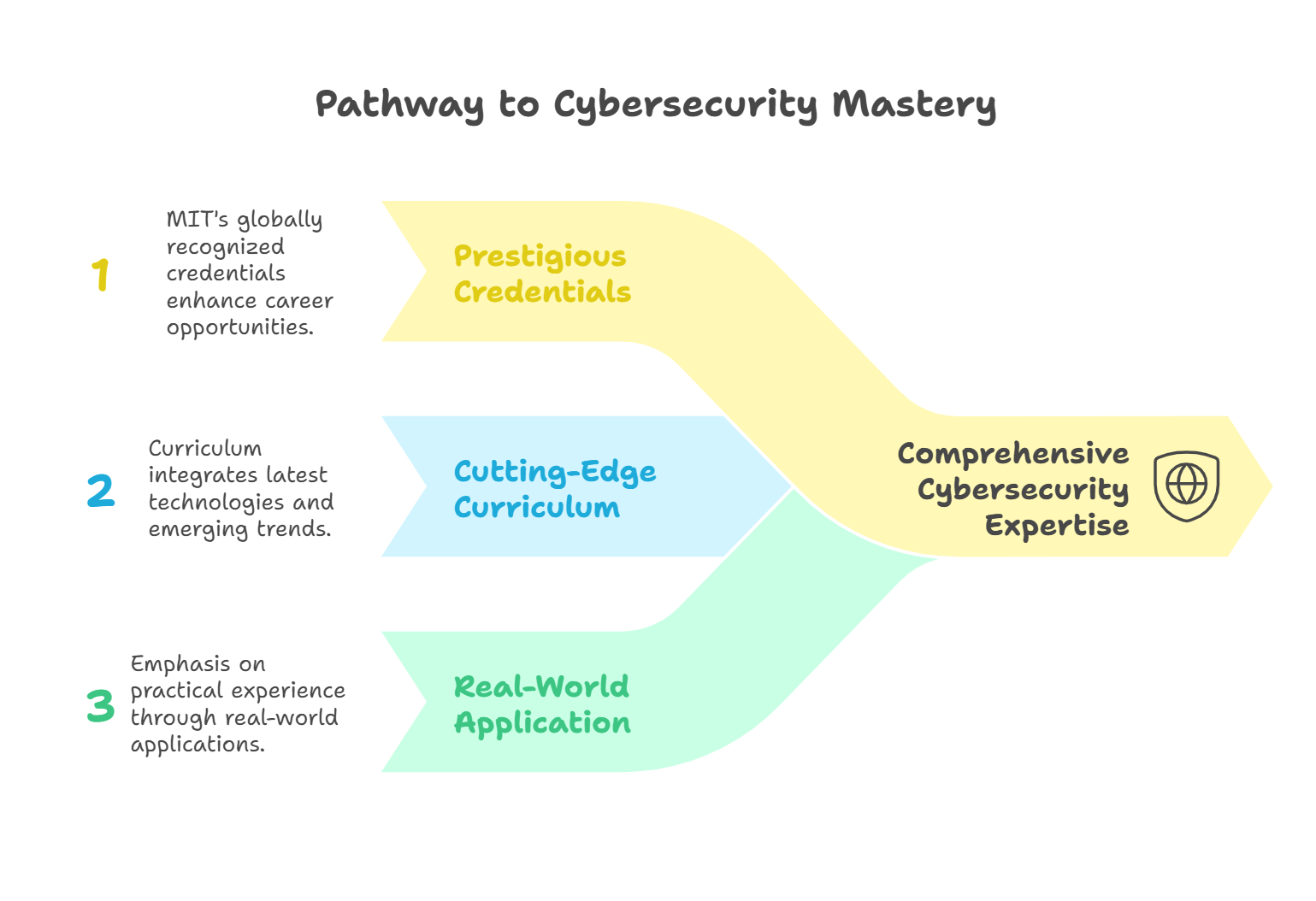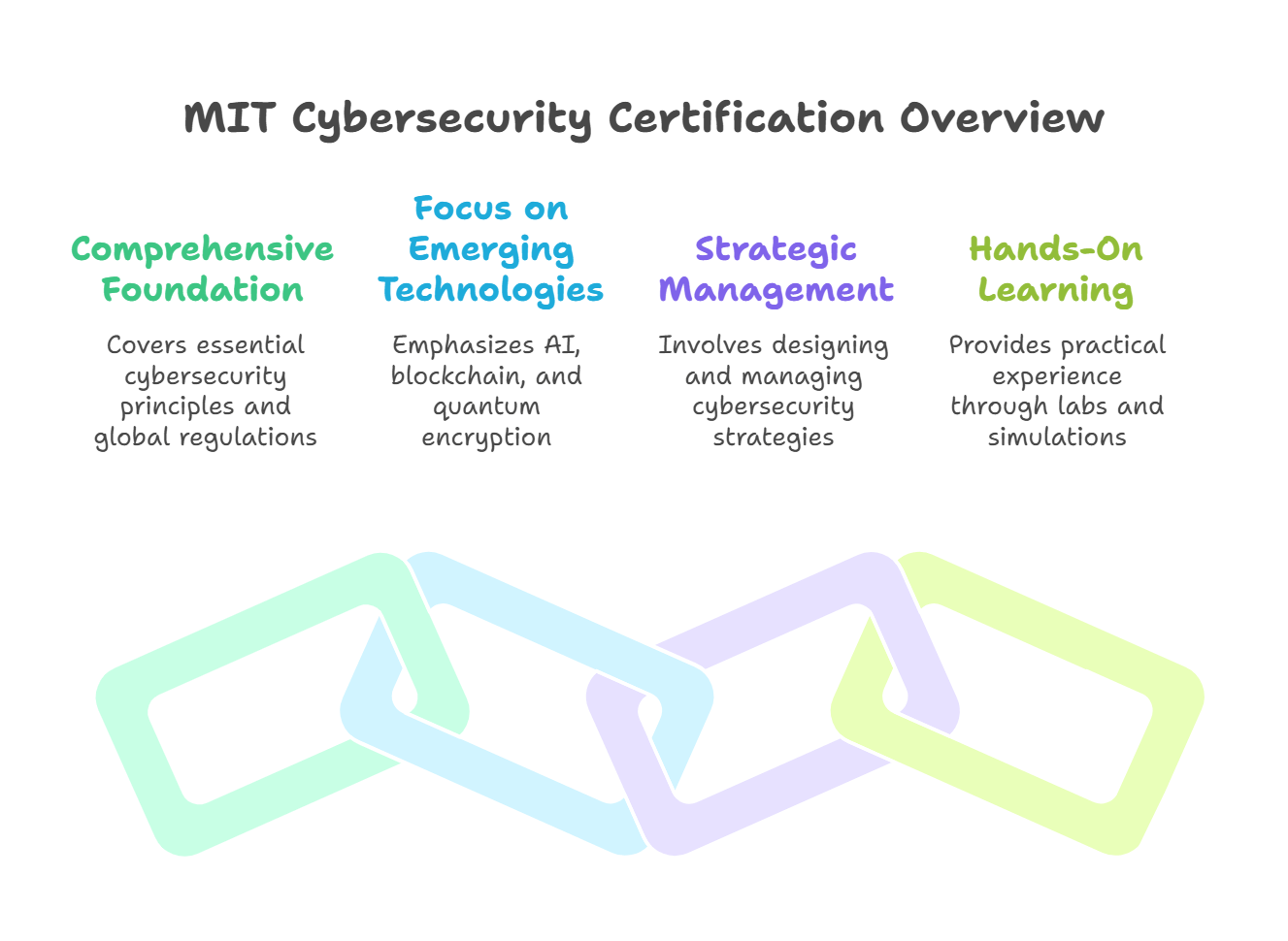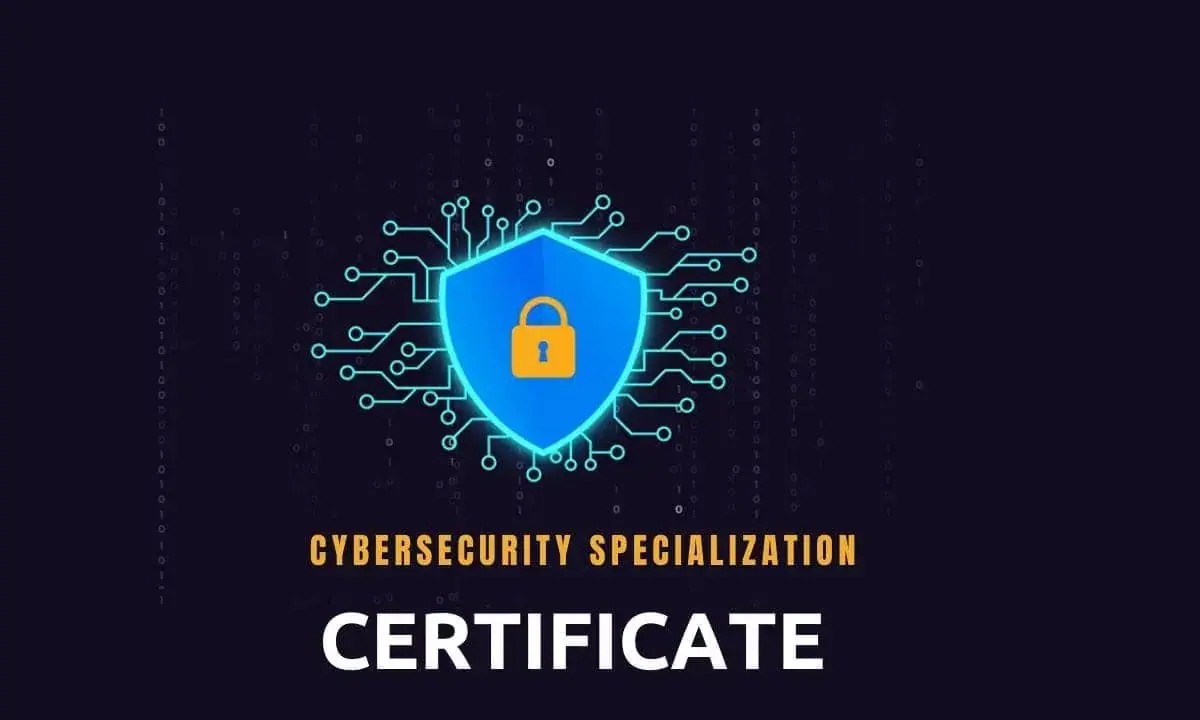Table of Contents
As cybersecurity continues to be one of the fastest-growing fields in the tech industry, the demand for skilled professionals who can safeguard sensitive data, networks, and systems is at an all-time high. Whether you’re starting your career or aiming to advance it, the MIT Cybersecurity Certification is one of the most prestigious programs available. With a blend of cutting-edge technologies, practical knowledge, and a rigorous academic framework, MIT provides a pathway to mastering cybersecurity in a digital age where threats are becoming more complex by the day.
In today’s interconnected world, cybersecurity is no longer just a luxury—it’s a necessity. Every organization, from small businesses to large enterprises, needs professionals who can not only identify and mitigate threats but also stay ahead of cybercriminals. The MIT Cybersecurity Certification equips you with the necessary skills to excel in the cybersecurity field, providing comprehensive knowledge of both technical skills and compliance requirements, which are critical in today's highly regulated global environment.
Why Choose a Cybersecurity Certification from MIT?
Choosing the right cybersecurity certification is a significant decision, and MIT’s offering stands out due to its prestigious credentials and real-world focus. In this section, we explore why this program is an ideal choice for those serious about advancing their careers in cybersecurity.

Prestigious Credentials
One of the most notable reasons for choosing the MIT Cybersecurity Certification is the value that comes with MIT’s name. MIT’s reputation is globally recognized, and holding a certification from such a prestigious institution automatically signals to employers that you have received world-class training. The credibility that MIT offers is invaluable in a competitive job market, especially as cybersecurity positions continue to grow in demand. Graduating from MIT signifies that you have completed an academically rigorous program designed to produce professionals capable of handling the most complex challenges in cybersecurity.
MIT’s prestigious credentials are especially advantageous for professionals looking to work in high-demand sectors such as finance, healthcare, and government. These industries often require cybersecurity professionals to adhere to stringent regulatory standards, and MIT’s certification demonstrates that you are equipped with the technical expertise and strategic insights needed to meet these standards.
Cutting-Edge Curriculum
MIT’s cybersecurity program is designed to keep students at the forefront of the industry by integrating the latest technologies and research into the coursework. As the world of cybersecurity constantly evolves, MIT’s curriculum is continually updated to ensure that students are exposed to the most cutting-edge tools and techniques available. From artificial intelligence (AI)-driven cybersecurity solutions to blockchain and quantum-safe encryption methods, MIT ensures that its graduates are prepared for the cybersecurity challenges of tomorrow, not just today.
The curriculum focuses on both foundational knowledge and emerging technologies, giving students a balanced education that covers everything from the basics of data protection to the use of AI in threat detection. By integrating emerging technologies, students gain hands-on experience with innovative tools that are increasingly being adopted across industries. Whether it's applying blockchain for securing digital transactions or preparing for the impact of quantum computing, MIT provides a comprehensive education that allows you to stay ahead of industry trends.
Real-World Application
One of the most valuable aspects of the MIT Cybersecurity Certification is its emphasis on real-world applications. Cybersecurity is not just about learning theory—it’s about being able to apply that knowledge to solve problems and mitigate threats in real-time. The program incorporates case studies, breach simulations, and security labs, all of which ensure that you graduate with practical, hands-on experience.
Students at MIT are exposed to real-world scenarios that require them to think critically and apply their knowledge in a practical setting. This experiential learning approach prepares you for the complex challenges you’ll face in the workplace, where theoretical knowledge alone is often not enough to combat emerging cyber threats. The hands-on training ensures that you’ll be ready to contribute meaningfully to cybersecurity operations from day one, rather than merely completing theoretical coursework.
Key Features of Cybersecurity Certification MIT
The MIT Cybersecurity Certification offers several key features that make it a standout choice for professionals looking to enhance their cybersecurity knowledge and skills. Here’s a breakdown of the key components of the program:

1. Comprehensive Cybersecurity Foundation
A solid foundation in cybersecurity principles is essential for anyone entering the field, and MIT’s Cybersecurity Legal Certification program begins by establishing this critical base. The foundation includes fundamentals like encryption, firewalls, and secure network designs, which are integral to safeguarding digital systems. Understanding these basic principles is crucial for identifying vulnerabilities and mitigating risks before they become significant threats.
Additionally, the Cybersecurity Legal Certification program delves into global security regulations such as GDPR (General Data Protection Regulation), HIPAA (Health Insurance Portability and Accountability Act), and frameworks like NIST (National Institute of Standards and Technology). These regulations govern how sensitive data must be handled, ensuring that professionals are not only technically proficient but also legally compliant when managing cybersecurity measures.
By establishing this comprehensive foundation, MIT ensures that its students have the necessary knowledge to approach cybersecurity from both a technical and a regulatory perspective. This combination of skills is particularly valuable in today’s global landscape, where cybersecurity issues often cross national boundaries and require understanding of both technical solutions and legal frameworks.
2. Focus on Emerging Technologies
As the digital world rapidly evolves, emerging technologies such as artificial intelligence, blockchain, and quantum encryption are becoming integral to cybersecurity. MIT’s program recognizes the importance of staying ahead of technological trends, and as such, it places a strong emphasis on incorporating these emerging technologies into the curriculum.
For example, AI-powered cybersecurity solutions are rapidly being adopted by businesses to predict and detect cyber threats before they occur. Blockchain technologies are being used for secure, transparent digital transactions, while quantum encryption methods are being explored for their potential to create unbreakable encryption methods, ensuring the security of highly sensitive information.
The focus on emerging technologies ensures that MIT graduates are not just prepared to tackle current cybersecurity challenges but are also equipped to navigate future advancements in the field. By staying ahead of the curve, you will have the opportunity to contribute to cutting-edge cybersecurity solutions and make a real impact in an evolving industry.
3. Strategic Cybersecurity Management
Cybersecurity is not just about technical proficiency; it also involves strategic decision-making and management skills. MIT’s program incorporates cybersecurity management, ensuring that students gain the skills necessary to design, implement, and manage large-scale security strategies. This includes developing risk-management structures that allow organizations to anticipate potential threats and create a cohesive cybersecurity policy.
With a strategic focus, students learn how to align cybersecurity efforts with organizational goals, ensuring that security measures are not just reactive but proactive. Additionally, students are taught how to drive long-term security strategies that account for emerging threats and evolving regulations. This holistic approach makes graduates of MIT’s cybersecurity program highly sought after by companies that require both technical expertise and strategic insight.
4. Hands-On Learning
Practical, hands-on experience is a cornerstone of MIT’s cybersecurity certification. Throughout the program, students engage in security labs, breach simulations, and case studies, where they work with real-world data and digital systems to tackle cyber threats. This hands-on learning ensures that graduates not only understand theoretical concepts but also have the experience to apply those concepts in a real-world context.
The case studies often involve tackling current cybersecurity issues faced by businesses, while the breach simulations replicate real-life cyber-attacks. These exercises allow students to practice responding to threats, formulating mitigation strategies, and implementing security measures—skills that are crucial when it comes to protecting an organization’s digital assets. By the end of the program, graduates are not just equipped with knowledge but also the practical skills necessary to handle cybersecurity challenges in the workplace.
Final Thoughts
The MIT Cybersecurity Certification is more than just a credential—it’s a powerful career transformation tool for those who wish to succeed in the fast-paced, ever-evolving world of cybersecurity. With a curriculum that combines cutting-edge technologies with real-world applications, this program equips you with the skills and knowledge needed to handle complex cybersecurity challenges. MIT’s focus on both technical skills and strategic insights ensures that graduates are not only prepared to tackle today’s cyber threats but are also well-positioned to adapt to the future landscape of cybersecurity.
Whether you're starting your career in cybersecurity or looking to enhance your existing knowledge, the MIT Cybersecurity Certification provides the necessary foundation to thrive in this growing industry. The program’s prestige and comprehensive approach ensure that you are well-prepared for any cybersecurity challenge, and the real-world application of your studies guarantees you’re ready to make a meaningful impact in any organization.
For those looking to expand their expertise even further, pairing the MIT certification with advanced modules from ACSMI will provide a well-rounded, versatile skill set. By continually building on your knowledge and staying updated on emerging technologies, you will solidify your position as a highly skilled cybersecurity professional in a competitive job market.
Invest in your future today with MIT’s Cybersecurity Certification, and take the first step toward safeguarding the digital world of tomorrow.
FAQs About Cybersecurity Certification MIT
1. What is the cybersecurity certification MIT?
The MIT Cybersecurity Certification is a program designed to equip professionals with the essential skills and knowledge needed to protect digital assets in an increasingly complex technological landscape. The certification focuses on both the technical aspects of cybersecurity, such as encryption and threat detection, and the strategic management of cybersecurity frameworks, ensuring compliance with global regulations like GDPR and HIPAA. MIT’s comprehensive curriculum ensures that graduates are prepared to handle evolving cyber threats and contribute meaningfully to organizational cybersecurity initiatives.
2. Who should take the MIT cybersecurity certification?
The MIT Cybersecurity Certification is ideal for a variety of professionals, including IT professionals, compliance officers, and legal consultants who wish to gain specialized expertise in cybersecurity. It’s also suitable for entrepreneurs and business owners looking to secure their digital infrastructure. Anyone who wants to develop both technical and strategic skills in cybersecurity, from foundational knowledge to the latest technologies, can benefit from this program. Whether you're starting in cybersecurity or looking to advance your current skill set, MIT’s certification prepares you for the next step in your career.
3. Is the MIT cybersecurity certification online or on-campus?
MIT offers a flexible format for its cybersecurity certification, combining both online and on-campus learning options. This hybrid approach allows students to learn at their own pace while also benefiting from the face-to-face interactions and networking opportunities offered by on-campus courses. Whether you are a working professional looking for an online option or a full-time student wanting to engage directly with professors and peers, the hybrid learning format at MIT ensures that all students can access world-class education tailored to their personal needs and schedules.
4. How long does the program take to complete?
The MIT Cybersecurity Certification can typically be completed in a few months to a year, depending on whether you choose to study part-time or full-time. If you opt for the online courses, you can proceed at your own pace, making it ideal for professionals who want to balance work and education. For those attending on-campus sessions, the program may take about 6-12 months to complete. MIT offers various options to fit your schedule, ensuring that the program can work around your professional and personal commitments.
5. Can this certification be expanded?
Yes, MIT’s Cybersecurity Certification can easily be expanded by pairing it with additional certifications, such as those offered by ACSMI (Advanced Cybersecurity Management Institute). ACSMI offers more than 400 modules that dive deep into niche areas of cybersecurity, such as AI governance, blockchain legislation, and quantum encryption. By combining MIT’s certification with ACSMI’s advanced training, you can gain a broader, more specialized skill set that makes you more versatile in the cybersecurity job market. This combination helps you bridge gaps in niche knowledge while also equipping you for leadership roles in the cybersecurity field.

Leave a Reply